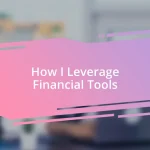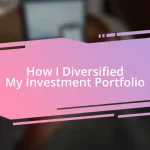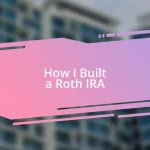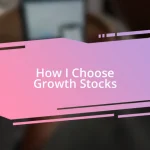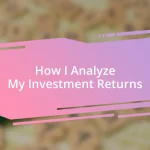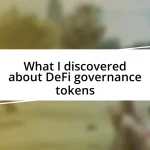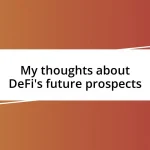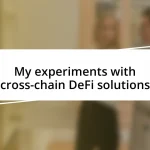Key takeaways:
- Blockchain education platforms provide a blend of theoretical knowledge and hands-on experience, fostering a sense of community that enhances the learning journey.
- Key benefits include decentralization, transparency, and the development of in-demand skills, which empower learners and increase job market competitiveness.
- Future trends point towards personalized learning through adaptive technologies, immersive experiences like VR, and interdisciplinary approaches that broaden understanding of blockchain’s impact across various sectors.

Introduction to blockchain education platforms
Blockchain education platforms have emerged as crucial resources in an age where technology and finance intersect. I remember my first encounter with such a platform; the thrill of discovering complex concepts like decentralized finance (DeFi) and smart contracts was both overwhelming and exhilarating. How often do we get the chance to dive deep into innovative fields that hold the potential to reshape our world?
As I navigated through these platforms, I was struck by their diversity. Some focus on theoretical knowledge, while others emphasize practical applications. My experience with hands-on projects taught me more than traditional education ever could. Suddenly, I wasn’t just a spectator; I was an active participant in the blockchain ecosystem.
Moreover, the sense of community in these platforms cannot be overstated. I found myself engaging with fellow learners and industry experts, exchanging ideas and insights. Those vibrant interactions made me ponder—what better way to learn than from the experiences of others? The blend of structured learning and peer interaction transforms the educational journey in ways that are both meaningful and impactful.

Benefits of using blockchain platforms
The decentralized nature of blockchain platforms is one of their most compelling benefits. When I first experienced this aspect, it felt revolutionary. No single entity controlled the information; instead, it was distributed across a network. This democratization of knowledge not only increases accessibility but also fosters a level of trust. For a learner like me, knowing that the information is secure and unchangeable provided a sense of confidence that traditional platforms often lack.
Another significant advantage is the transparency that blockchain offers. I vividly remember working on a project where each step was recorded on the blockchain. This meant that all participants could verify progress and outcomes without ambiguity. I felt empowered knowing that every piece of data was traceable and verifiable, which added a layer of accountability that resonates deeply with how I view education: it should be clear, traceable, and above all, accountable.
Lastly, using blockchain platforms often leads to skills that are increasingly in demand in the job market. Through my experiences, I learned not just about blockchain theory but gained hands-on skills, like developing smart contracts. This practical knowledge not only bolstered my resume but also gave me real confidence. I often think, in today’s job landscape, having these specialized skills can make a stark difference in career opportunities.
| Benefit | Explanation |
|---|---|
| Decentralization | Information is distributed across a network, increasing accessibility and trust. |
| Transparency | Every step is verifiable, promoting accountability and clarity in education. |
| Skill Development | Hands-on experience with in-demand skills makes graduates more competitive in the job market. |

Key features of effective platforms
When I reflect on my journey through various blockchain education platforms, several key features stand out as essential for effective learning experiences. One that truly resonated with me was the platform’s user interface. I’ve encountered a few which were clunky and overwhelming, but those that emphasized simplicity and intuitive design allowed me to navigate easily and focus on the content rather than getting lost in the technology.
Additionally, interactive learning options are a must-have. I remember diving into a platform that offered real-time simulations and scenario-based exercises. It was thrilling to put theory into practice in a safe, virtual environment. Such engagement not only reinforced my understanding but made learning enjoyable.
Here are some standout features that I believe define effective blockchain education platforms:
- User-Friendly Interface: Simplistic navigation helps learners focus on content without distraction.
- Interactive Learning: Engaging tools like simulations enhance practical understanding and retention.
- Diverse Course Offerings: A range of topics allows learners to explore various aspects of blockchain technology.
- Supportive Community: Access to forums and mentors fosters collaboration and knowledge-sharing among peers.
- Regular Updates: Constantly refreshed content keeps pace with the rapid evolution of blockchain technology.
From my perspective, these elements collectively create a rich learning environment that not only educates but also inspires. It’s exciting to think about how new platforms continue to evolve in response to community feedback and technological advancements.

My top recommended platforms
When it comes to blockchain education platforms, I wholeheartedly recommend Udacity for its nano-degree programs. I remember starting with their Blockchain Developer track, and the in-depth project-based approach helped me grasp critical concepts while building real-world applications. It was thrilling to watch my progress as I developed my own dApps; there’s something tangible about seeing a project come to life that truly cements learning.
Then there’s Coursera, which offers a variety of courses from renowned institutions. I took a course that explored the intersection of blockchain and finance, and it opened my eyes to how this technology is reshaping industries. The flexibility of learning at my own pace while still having access to expert instructors made my experience feel like I was part of an academic community, even from my living room.
Lastly, I cannot emphasize enough how much I value platforms like Blockchain Academy. Their engaging content and supportive forums reminded me of my college days, where exchanging ideas with peers fueled my passion for learning. Have you ever felt that spark of inspiration when discussing concepts with others? That’s the magic of a vibrant learning community, and this platform embodies it beautifully.

My learning journey and challenges
Reflecting on my learning journey in blockchain education, I quickly realized that the path wasn’t always smooth. There were times when I sat in front of my screen, overwhelmed by the sheer amount of information. I vividly remember one evening, frustrated by a particularly complex concept, staring at my notes and questioning if I was cut out for this. It felt daunting, but that moment of vulnerability pushed me to seek help and connect with others facing similar challenges.
As I navigated through these platforms, my perspective began to shift. I found myself actively participating in online discussions, sharing my struggles and triumphs with fellow learners. It was during these exchanges that I discovered just how powerful community support is. I can recall a moment when a peer shared a simple analogy that clicked perfectly for me. Have you ever had one of those lightbulb moments? It’s exhilarating! Those pivotal interactions transformed my challenges into stepping stones that fueled my resolve.
Moreover, I learned that adapting my study habits was essential. Some days, I’d immerse myself in theoretical lessons, while on others, I’d tackle hands-on projects. Balancing both approaches wasn’t always easy, and there were times I questioned whether I was dedicating enough time to each. I found that experimenting with different methods not only made learning enjoyable but also revealed which strategies worked best for me. And doesn’t it feel rewarding to uncover the techniques that truly resonate with your unique style? Every challenge I faced was not just a hurdle, but an opportunity for growth.

Tips for maximizing learning
To maximize your learning experience on blockchain education platforms, it’s crucial to set specific goals. When I first started, I established clear milestones, such as completing one module per week. This small change helped me stay focused and motivated, allowing me to celebrate little victories along the way. Have you noticed how powerful a sense of accomplishment can be in maintaining momentum?
Engaging with course material actively can dramatically enhance retention. Instead of passively watching videos, I took detailed notes and posed questions as I learned. I remember sitting down after a particularly challenging lesson and summarizing what I learned in my own words. This practice not only deepened my understanding but also transformed abstract concepts into relatable ideas. Have you ever tried teaching someone else what you’ve learned? That can be a game-changer!
Lastly, don’t underestimate the power of community. I found that joining study groups really enriched my experience. Sharing insights and diverse perspectives with others made the learning process feel less isolated. One memorable group session was where we dissected a case study together, and I was amazed at how my peers brought different angles to the table. That collaborative spirit made some of the more daunting topics feel approachable, right? It’s incredible how the right community can turn learning from a solo endeavor into a shared adventure.

Future trends in blockchain education
As I think about the future trends in blockchain education, I can’t help but notice the increasing shift towards personalized learning experiences. I remember when I first encountered adaptive learning technologies, and how they transformed my educational journey. Imagine being guided through your courses with content tailored specifically to your understanding and progress. Isn’t it exciting to think that soon, blockchain platforms might use AI to identify where you excel and where you struggle, allowing for a truly customized path forward?
Moreover, immersive technologies like virtual reality (VR) are on the horizon. Just envision a classroom where you can walk through a simulated blockchain network, visualizing transactions in real-time. I’ve always found it easier to grasp complex concepts when I can visualize them. When I first tried a VR module for understanding consensus mechanisms, it felt like I was diving into a whole new world. Wouldn’t it be incredible if every learner could experience that sense of presence and immersion?
Lastly, the growing emphasis on interdisciplinary approaches in blockchain education catches my eye. It’s not just about the technology anymore; it’s about understanding its impact on various sectors. I’ve seen how discussions with peers studying law, finance, and ethics expanded my comprehension of blockchain’s potential. Have you ever considered how interconnected different fields can be? The trend towards this holistic learning could really prepare us for the complexities of implementing blockchain in diverse real-world scenarios.

